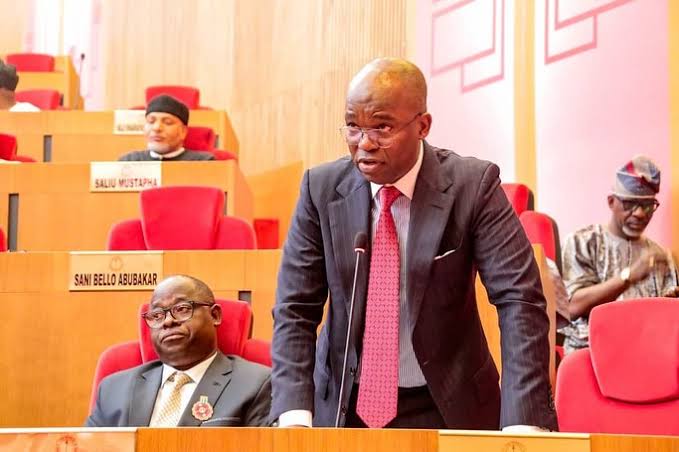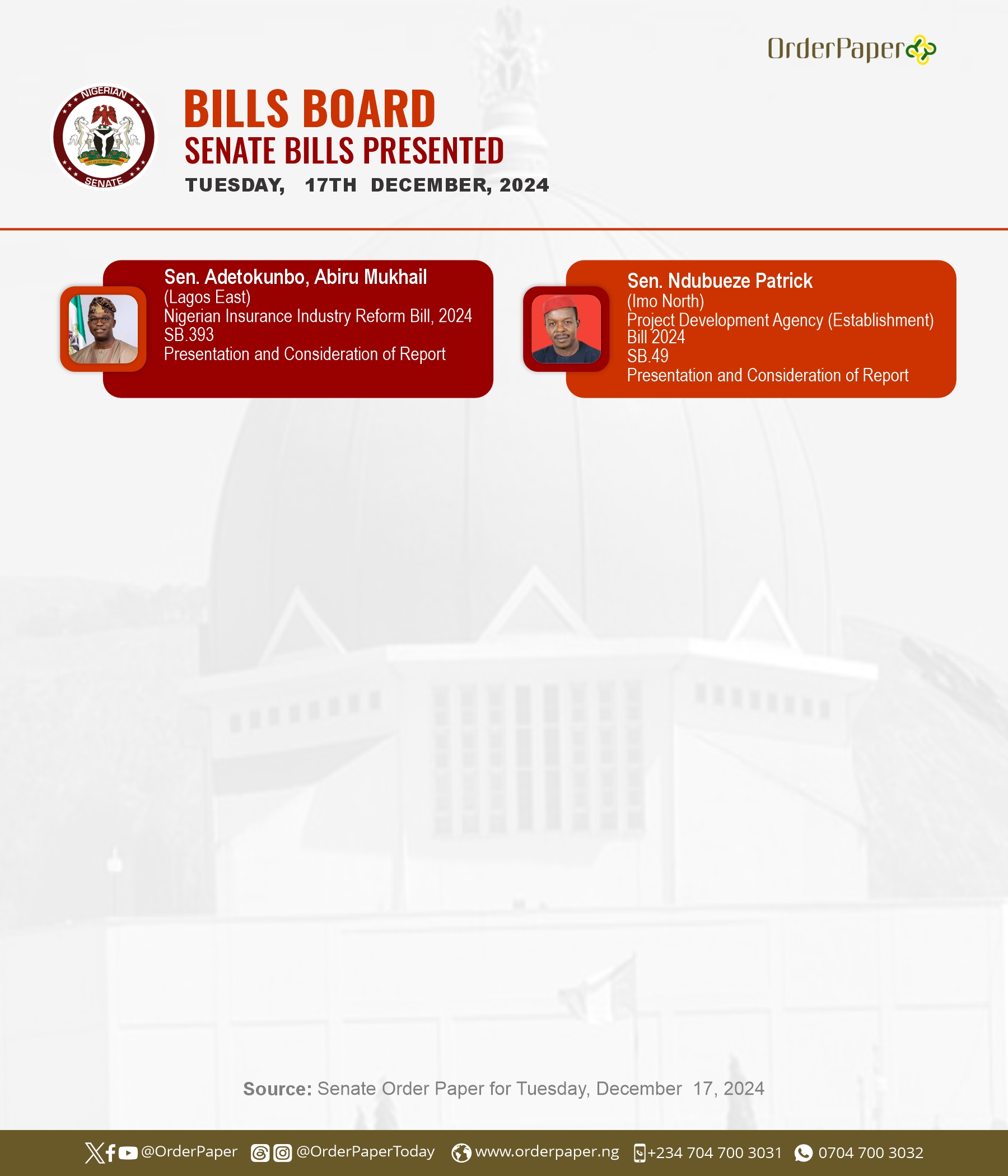The Senate, at today’s plenary, passed the 2024 Nigerian Insurance Industry Reform Bill to consolidate existing insurance laws and reduce reinsurance capital requirements, while also addressing insecurity by proposing laws to limit cross-border cattle movement and advocating for modern ranches to curb farmer-herder conflicts. Additionally, the senate upheld the dismissal of a petitioner over job racketeering allegations and rejected a separate wrongful termination petition, emphasizing adherence to due process and existing regulations.

Senate passes insurance reform bill
The senate has passed the 2024 Nigerian Insurance Industry Reform Bill, aimed at establishing a comprehensive legal framework for regulating and supervising all insurance businesses in Nigeria. This development followed the presentation of a report by the committee on banking, insurance, and other financial institutions on the bill.
While presenting the report, Sen. Adetokunbo Abiru (APC, Lagos East) highlighted that the bill consolidates various existing insurance laws, including the Insurance Act (2003), Marine Insurance Act, Motor Vehicles (Third Party Insurance) Act, National Insurance Corporation of Nigeria Act, and the Nigerian Reinsurance Corporation Act.
A key provision in the bill is the reduction of the minimum capital requirement for reinsurance businesses from N45 billion to N35 billion.

Insecurity: Senate pushes for law limiting cross-border cattle movement
The Senate has directed its committees on National Security and Intelligence, Livestock, and Agriculture to collaborate with the federal government to establish modern cattle ranches across the country to curb insecurity caused by farmer-herder conflicts. It also resolved to enact legislation limiting the movement of cattle from neighboring countries into Nigeria.
These resolutions followed a motion by Senator Anthony Siyako Yaro (PDP, Gombe South), who highlighted the December 11 attacks on villages in Billiri, Gombe State, where suspected herders killed residents, burned homes, food supplies, and livestock, causing widespread displacement. Yaro expressed concern over the threat to peace, security, food sufficiency, and economic activities in the region and neighboring states like Taraba, Bauchi, and Adamawa.
Sen. Abdul Ningi (PDP, Bauchi Central) sympathised with the victims’ families, expressing frustration over the ineffective use of security votes allocated to state governors. Sen. Seriake Dickson (PDP, Bayelsa West) called for government-funded ranches to reduce tensions and improve the livelihoods of herders, while Sen. Adams Oshiomhole (APC, Edo North) advocated for a national public hearing to address security issues tied to economic activities and cross-border movement under the ECOWAS treaty.
To address the security crisis, the Senate urged the Inspector General of Police, the Chief of Army Staff, and the Director General of the DSS to investigate the Gombe attacks, arrest the perpetrators, and prevent further violence through the deployment of a joint police and military taskforce to Billiri. Additionally, it called on the Ministry of Humanitarian Affairs, NEMA, and the North East Development Commission to provide relief materials to displaced victims.
READ ALSO: Senate turns heat on petitioner over alleged job racketeering

Senate turns heat on petitioner over alleged job racketeering
The Senate has upheld the dismissal of Uwalaka Peter Ebere from the Office of the Auditor General for the Federation over allegations of job racketeering and fraudulent extortion from job seekers. The Senate’s decision, based on a report by the Committee on Ethics, Code of Conduct, and Public Petitions, is intended to deter similar misconduct and directs the Auditor General’s office to identify and prosecute other culpable officers. Uwalaka, who petitioned against his 2020 dismissal, denied the allegations, claiming his role was limited to introducing an applicant to Tolo Tariga, whom he accused of orchestrating the scheme. He further alleged that he was dismissed without due process and criticised the unlawful stoppage of his salary.
However, the Auditor General’s office refuted his claims, citing multiple complaints and evidence of Uwalaka’s involvement in fraudulent activities, including issuing fake appointment letters.
In a separate case, the Senate rejected a petition by Yakubu Gaku Mbaka against the Niger Delta Power Holding Company Limited (NDPHC) concerning his alleged wrongful termination in 2018. Mbaka, represented by U.C. Okparaugo Esq., sought reinstatement, arguing that the termination was unjust. However, the Senate committee, chaired by Sen. Neda Imasuen, found that Mbaka, initially hired as domestic security staff for a former MD/CEO, continued in that role until the MD/CEO’s departure. Following his recall to the NDPHC headquarters, the company outsourced its security operations, leading to Mbaka’s disengagement due to a lack of suitable roles.
The committee concluded that Mbaka’s termination was in line with established procedures, as he received all entitlements, including a severance allowance and one-month salary in lieu of notice, and signed documents acknowledging his exit. Based on these findings, the Senate rejected Mbaka’s petition for reinstatement, affirming that his termination adhered to proper processes and contractual obligations.
BILLS CHART FOR THE DAY
Below is OrderPaper’s signature presentation of bills taken in the Senate plenary today. Readers are invited to contact us for further information via info@orderpaper.ng or WhatsApp via +234 704 700 3031.



